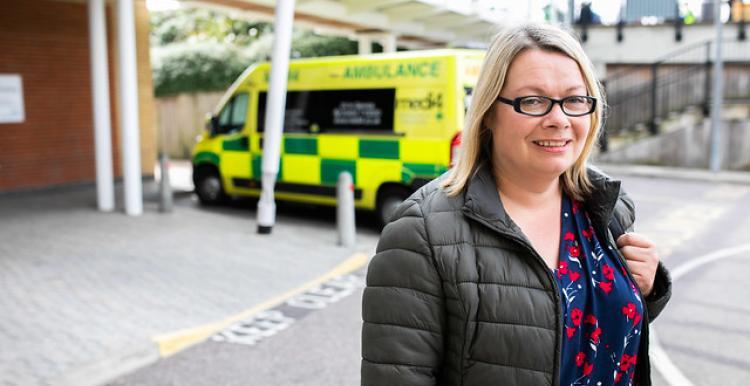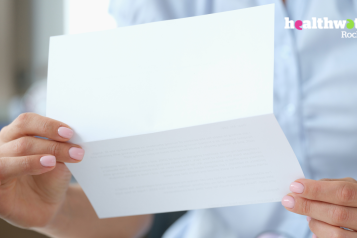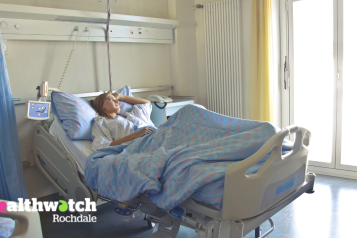Think you need to go to A&E? Call NHS 111 first

The NHS wants to make it easier and safer for patients to get the right treatment when they need it, without waiting a long time to be seen in A&E.
Because of the coronavirus pandemic, crowded waiting rooms are also putting patients and hospital staff at risk of catching COVID-19.
How will the service work?
From 1 December 2020, the NHS is introducing a new system called NHS 111 First.
If you have an urgent, but not life-threatening health problem you can now contact NHS 111 First to find out if you need to go to A&E.
NHS 111 can book you an appointment at your local A&E or emergency department. This means you will have an allocated time to attend hospital and be treated, so you don’t have to wait a long time to be seen and can also help services avoid becoming overcrowded.
Your NHS 111 advisor or clinician could also make you a direct appointment with a GP, Pharmacist or Urgent Treatment Centre. They may also be able to give you the advice you need without using another service.
What will this mean for you?
If your condition is not life-threatening, 111 may direct you to a more appropriate service or one that can see you sooner. You may also be asked to wait at home until the emergency department is ready to see you, avoiding a long wait in A&E for you and helping to prevent overcrowding. If you need an urgent face-to-face assessment or treatment, NHS 111 should be able to arrange this immediately for you.
No one who turns up in A&E should be turned away or asked to call NHS 111.
How do you use NHS 111 First?
You can contact NHS 111 either online or by phone 24 hours a day, 7 days a week. The service is free to use, including from a mobile phone.
Call 111
Have you used NHS 111?
We want to hear from anyone who has used NHS 111 to book appointment at A&E or an alternative service, so we can understand how it is working for you and your loved ones. We then use your feedback to work with the NHS to improve how it runs services like NHS 111.
What should you do if you have a life-threatening emergency?
If you or a loved one has a life-threatening emergency, you should call 999 or go straight to your nearest emergency department. Examples of an emergency are:
- Loss of consciousness
- Acute confused state and fits that are not stopping
- Chest pain
- Breathing difficulties
- Severe bleeding that cannot be stopped
- Severe allergic reactions
- Severe burns or scalds
- Stroke
If you have been asked to wait at home until your appointment by NHS 111 and your condition changes, call 111 again. If you have been asked to wait at home by NHS 11 and you become seriously ill, call an ambulance.
Can I still walk into A&E?
If you do not want to use NHS 111 First, you can still walk into A&E for treatment. Patients who need emergency treatment will be seen first.
If your health condition is not as urgent, you may need to wait elsewhere or be asked to return for a later appointment to help manage social distancing in the waiting room.
A medical professional at A&E will assess you and may direct you to a different service if appropriate. If you do not want to be seen by another service, you can still wait in A&E, but you might have to wait longer.
No one who turns up to A&E in person should be turned away and told to call NHS 111 instead. If this has happened to you or someone you know, tell us in our short online survey.
What should you do if you have an ongoing medical problem that is looked after by the hospital, which you manage by going straight to A&E when you are ill?
It might be better for you to try and contact the hospital specialists that look after you before your go to A&E. Some patients with complicated medical problems need to be looked after in places other than A&E, particularly if you are vulnerable to infection. But, if you are extremely ill, go to your nearest emergency department or call an ambulance.
What should you do if you have difficulties communicating or hearing?
- You can tell the call handler that you need an interpreter.
- Call 18001 111 on a text phone or using the Next Generation Text (NGT) Lite app on your smartphone, tablet or computer.
- Use the NHS 111 British Sign Language (BSL) interpreter service if you’re Deaf and want to use the phone service.
How else can NHS 111 help me?
NHS 111 helps people get the right physical and mental health advice and treatment when hey urgently need it. A specialist health advisor will asses your health needs, give advice, refer you to the most appropriate care service or send an ambulance in case of emergency.
Depending on where you live or the services available in your area, NHS 111 can also be used to book same-day appointments at local pharmacists, GPs and Urgent Care Centres, so you can receive the right type of treatment. If they cannot make you an appointment, they will direct you to the best service to meet your health needs.
Clinicians such as nurses, GPs and paramedics now play a large role within NHS 111 and may be able to give you the advice or treatment you need without accessing another service.


